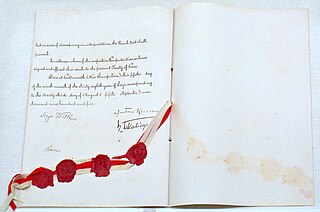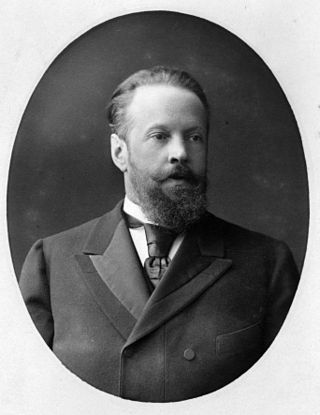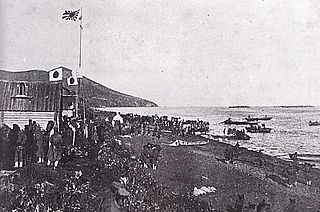
The Russo-Japanese War was fought between the Empire of Japan and the Russian Empire during 1904 and 1905 over rival imperial ambitions in Manchuria and the Korean Empire. The major theatres of military operations were in Liaodong Peninsula and Mukden in Southern Manchuria, and the Yellow Sea and the Sea of Japan.

The Treaty of Portsmouth is a treaty that formally ended the 1904–1905 Russo-Japanese War. It was signed on September 5, 1905, after negotiations from August 6 to August 30, at the Portsmouth Naval Shipyard in Kittery, Maine, United States. U.S. President Theodore Roosevelt was instrumental in the negotiations and won the Nobel Peace Prize for his efforts.

The Battle of Tsushima, also known in Japan as the Battle of the Sea of Japan, was the final naval battle of the Russo-Japanese War, fought on 27–28 May 1905 in the Tsushima Strait. A devastating defeat for the Imperial Russian Navy, the battle was the only decisive engagement ever fought between modern steel battleship fleets and the first in which wireless telegraphy (radio) played a critically important role. The battle was described by Sir George Clarke as "by far the greatest and the most important naval event since Trafalgar".

The Treaty of Shimonoseki, also known as the Treaty of Maguan in China and Treaty of Bakan in the period before and during World War II in Japan, was a treaty signed at the Shunpanrō hotel, Shimonoseki, Japan on April 17, 1895, between the Empire of Japan and Qing China, ending the First Sino-Japanese War. The peace conference took place from March 20 to April 17, 1895. This treaty followed and superseded the Sino-Japanese Friendship and Trade Treaty of 1871.

Count Sergei Yulyevich Witte, also known as Sergius Witte, was a Russian statesman who served as the first prime minister of the Russian Empire, replacing the emperor as head of the government. Neither a liberal nor a conservative, he attracted foreign capital to boost Russia's industrialization. Witte's strategy was to avoid the danger of wars.

Zinovy Petrovich Rozhestvensky was an admiral of the Imperial Russian Navy. He was in command of the Second Pacific Squadron in the Battle of Tsushima, during the Russo-Japanese War.

The Battle of Port Arthur of 8–9 February 1904 marked the commencement of the Russo-Japanese War. It began with a surprise night attack by a squadron of Japanese destroyers on the neutral Russian fleet anchored at Port Arthur, Manchuria, and continued with an engagement the following morning; further skirmishing off Port Arthur would continue until May 1904. The attack ended inconclusively, though the war resulted in a decisive Japanese victory.

The Tripartite Intervention or Triple Intervention was a diplomatic intervention by Russia, Germany, and France on 23 April 1895 over the harsh terms of the Treaty of Shimonoseki imposed by Japan on the Qing dynasty of China that ended the First Sino-Japanese War. The goal was to stop Japanese expansion in China. The Japanese reaction against the Triple Intervention was one of the causes of the subsequent Russo-Japanese War.

A military attaché or defence attaché is a military expert who is attached to a diplomatic mission, often an embassy. This type of attaché post is normally filled by a high-ranking military officer, who retains a commission while serving with a diplomatic mission. Opportunities sometimes arise for service in the field with military forces of another sovereign state. The attache has the privileges of a foreign diplomat.

The Battle of Nanshan was one of many vicious land battles of the Russo-Japanese War. It took place on 24–26 May 1904 across a two-mile-wide defense line across the narrowest part of the Liáodōng Peninsula, covering the approaches to Port Arthur and on the 116-meter high Nanshan Hill, the present-day Jinzhou District, north of the city center of Dalian, Liaoning, China.

Vice Admiral Newton Alexander McCully (1867–1951) was an officer in the United States Navy who served in the Spanish–American War and World War I.

The Ōtsu incident was an unsuccessful assassination attempt on Nicholas Alexandrovich, Tsesarevich of Russia on 11 May [O.S. 29 April] 1891, during his visit to Japan as part of his eastern journey.

The Crimea Medal was a campaign medal approved on 15 December 1854, for issue to officers and men of British units which fought in the Crimean War of 1854–56 against Russia. The medal was awarded with the British version of the Turkish Crimea Medal, but when a consignment of these was lost at sea, some troops received the Sardinian version.

Oskar Ferdinand Gripenberg was a Finnish-Swedish general of the Russian Second Manchurian Army during the Russo-Japanese War.

Relations between the Empire of Japan and the Russian Empire (1855–1917) were minimal until 1855, mostly friendly from 1855 to the early 1890s, but then turned hostile, largely over the status of Manchuria and of Korea. The two empires established diplomatic and commercial relations from 1855 onwards. The Russian Empire officially ended in 1917, and was succeeded by Communist rule formalized in 1922 with the formation of the Soviet Union.
The Li–Lobanov Treaty or the Sino-Russian Secret Treaty was a secret and unequal treaty signed on June 3, 1896 in Moscow by foreign minister Alexey Lobanov-Rostovsky on behalf of the Russian Empire and viceroy Li Hongzhang on behalf of Qing China. The treaty and its consequences increased anti-foreign sentiment in China, which came to a head in the Boxer Uprising of 1900.

Granville Roland Fortescue was an American soldier, a Rough Rider serving with his cousin, Colonel Theodore Roosevelt in Cuba, a presidential aide in the first Roosevelt administration and later, a journalist and war correspondent for the London Standard during the Rif War in 1920 Spanish Morocco. He wrote for the London Daily Telegraph during World War I and during the Spanish Civil War.

Alexander Wilhelm Andreas Freiherr von Kaulbars was a Baltic German military leader who served in the Imperial Russian Army during the late 19th and early 20th centuries. A noted explorer of Central Asia, he was also regarded as one of the original organisers of the Russian Air Force.

Baron Dmitry Gustavovich Fyolkerzam, better known as Baron Dmitry Gustavovich von Fölkersahm, was a Russian admiral of Baltic German descent who served in the Imperial Russian Navy.

The invasion of Sakhalin was the last land battle of the Russo-Japanese War, and took place from 7 July to 31 July 1905.



















